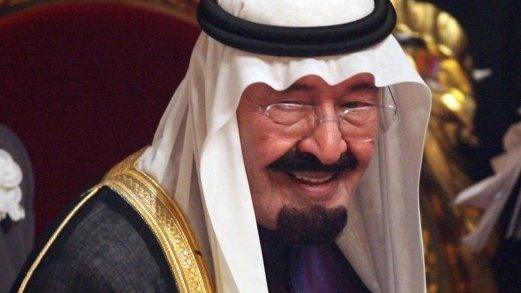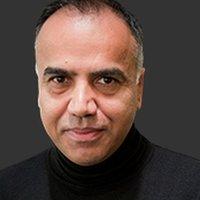Saudi Arabia's smooth succession and uncertain future
- Published
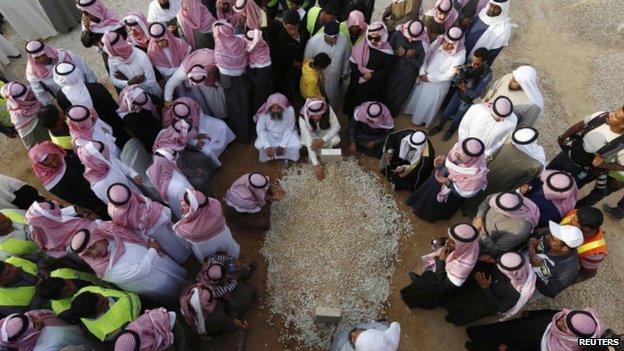
Mourners gather around Saudi Arabia's King Abdullah bin Abdulaziz's grave
Power is, in many ways, a family business.
You need only look at the looming prospect of (yet another) Bush-Clinton US presidential contest in 2016 to see that there must be something in the idea.
And so it is in Saudi Arabia.
But, in true Saudi Arabian style, the family business involves a much bigger family and the money involved is that much greater.
The bad news, however, is that the family business is set in a dodgy and ever more violent neighbourhood.
On top of that, some other long-running family businesses in the area (think Gaddafi and Mubarak) have gone down the pan rather suddenly and somewhat unexpectedly.
The critics and enemies of Saudi Arabia's ruling family, and they have plenty both in and out of the country, had been predicting for a while that when King Abdullah bin Abdulaziz died, which he did on Friday, there would be a real possibility of chaos.
They had expected the fissures and disputes between rival factions within the ruling family to spill out into the wider world - but that has not happened.
And, for now at least, the ruling family have shown that when it comes to it, they know exactly what needs to be done to hang on to power.
Saudi Arabia's old ruler was buried and a new king installed on the throne in quick time. And the country declared it was business as usual. Well, not quite.
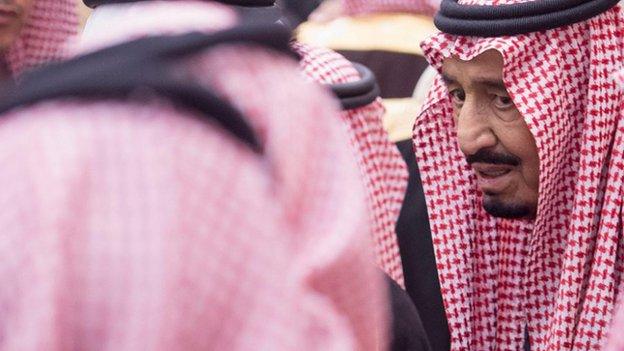
The new King of Saudi Arabia, Salman bin Abdulaziz, received dignitaries in Riyadh
Negotiations between members of the Saudi Arabia's first family about who gets what job must make the fraught negotiations in 2010 to form a coalition government in the UK seem like a walk in the park.
The key thing to note is King Salman's appointment of his half-brother, Prince Muqrin, as Crown Prince and next in line to the throne.
Prince Muqrin is a former head of Saudi Arabia's intelligence agency and the youngest surviving son of the country's founder.
The confirmation of Mohammed bin Nayef as Deputy Crown Prince is another important signal and an attempt to seal the deal for the next generation of grandsons, external all vying for position in the future.
But it's too early to tell what will happen, and the intrigue about the long-term succession will continue.
As the past few years across the Middle East have shown, there are no guarantees.
Family politics aside, the challenges for the Saudi Arabian rulers continue to multiply, at home and abroad.
At home, there are no signs that anyone has found a long-term answer to the country's economic and social problems.
Unemployment rates are high and the population is growing, with the young in particular restless and hungry for change.
Far too many Saudi Arabians rely on government jobs to make their way, and the country's human rights record continues to attract opprobrium worldwide.
Women's rights, or more accurately non-rights, also remain a festering sore, with the ban on women drivers just one item in a long list of restrictions.
Meanwhile, beyond the centre of power in Riyadh, things continue to deteriorate from the Saudi Arabian point of view.
There are problems with the Shia minority in the east of the country.
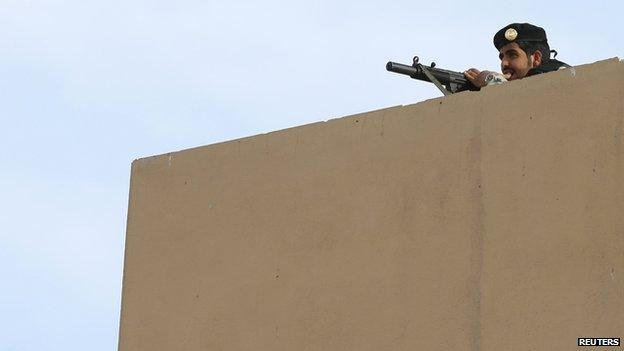
A Saudi Arabian security guard atop a building during the funeral of King Abdullah, in Riyadh
Neighbouring Bahrain, Sunni-ruled but with a Shia majority, is also an ongoing source of concern for Riyadh, external, as is Yemen, where Shia rebels now appear to have the upper hand in a fight with the government.
But above all, Iran is the bogeyman of the region, and the Saudi Arabians see the hand of Tehran at work everywhere.
They worry most about Iran's nuclear programme but also its influence over Iraq through that country's Shia majority.
Syria's civil war has spawned multiple uncertainties. And then of course there's Islamic State and the threat it poses, external to Saudi Arabian interests in the region.
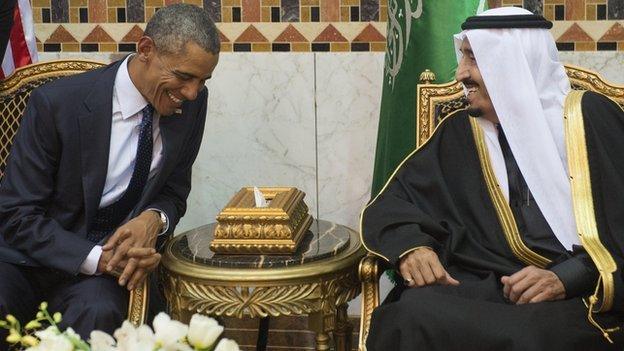
King Salman meets US President Barack Obama at the Erga Palace, in Riyadh
That's why US President Barack Obama's visit this week will have been a source of some comfort. The leader of the free world brought with him a big entourage, a visible expression of support for Saudi Arabia.
The relationship between the US and Saudi Arabia has had its ups and downs (the disagreements on the approach to Iran being one current example), but ties remain strong.
But at a time of huge volatility in the Middle East, the fact that this relationship endures is a puzzle to many critics. Many don't understand why the West generally, and particularly the US and Britain, refuses to cut the cord.
"Follow the money," is too crude an answer. But the money is a factor.
The Saudi Arabians have huge cash reserves, external built up over recent decades.
This money wields huge influence in the economies of the West, in everything from banking to property. And of course there's oil.
At the moment, the Saudi Arabians are sustaining oil output at a low price. They can afford to, given their vast cash reserves.
From an American view the depressed oil prices are also having the welcome effect of causing Russia some big economic problems.
And to understand why it's hard to cut the cord, despite all the discomfort over human rights and the alleged nebulous funding links from wealthy Saudi Arabian nationals to all manner of groups that are the sworn enemies of Western interests and values, all that's needed is to ask any American leader to envisage the Middle East without Saudi Arabia.
That thought alone sends a chill down the spines of most Washington insiders.
- Published10 March 2020
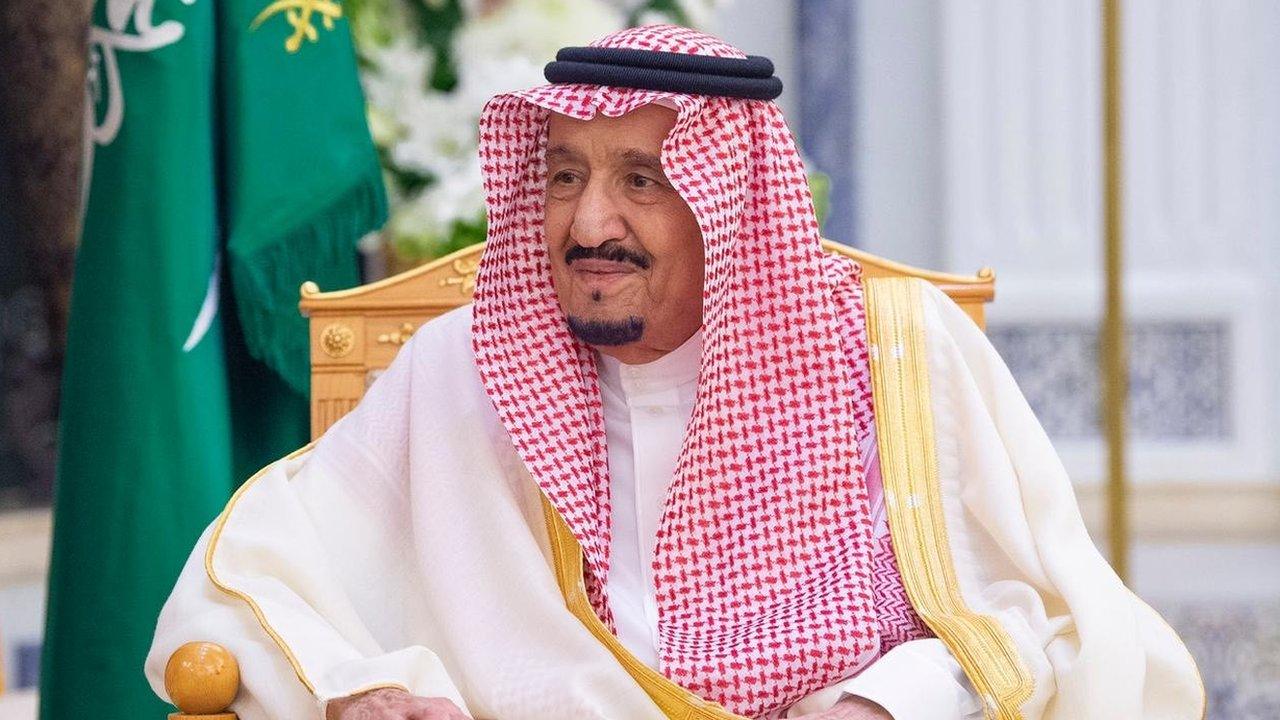
- Published23 January 2015
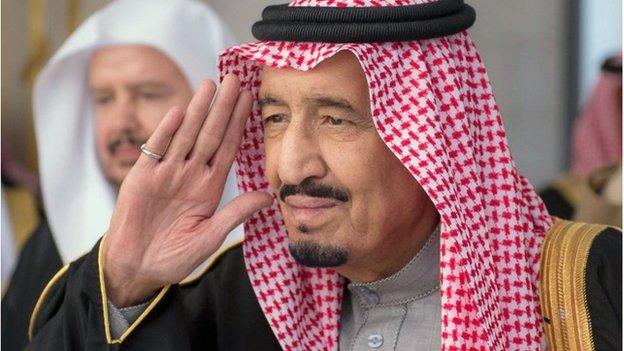
- Published23 January 2015
